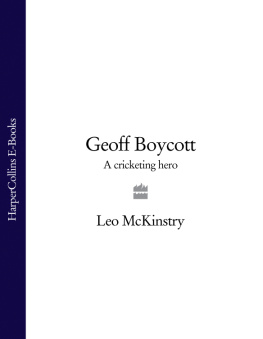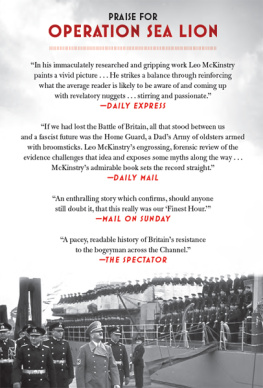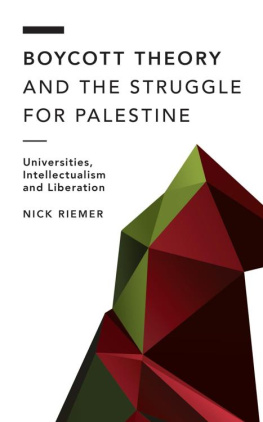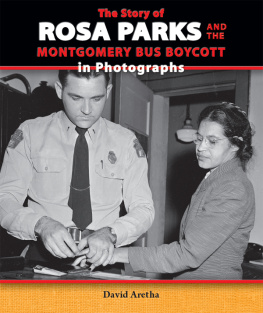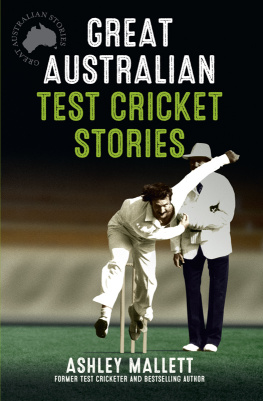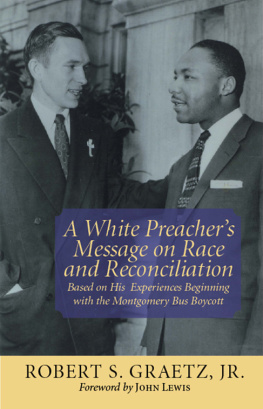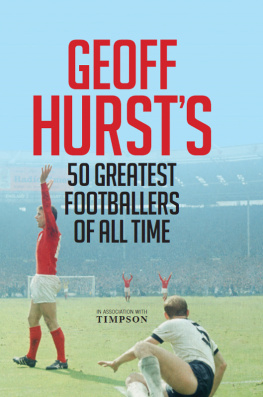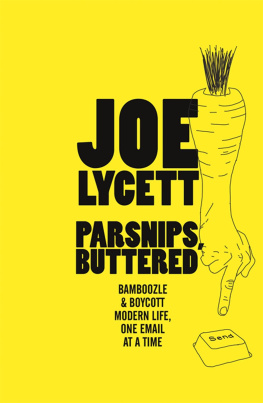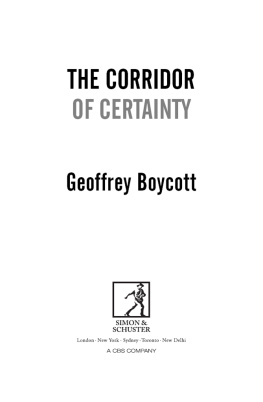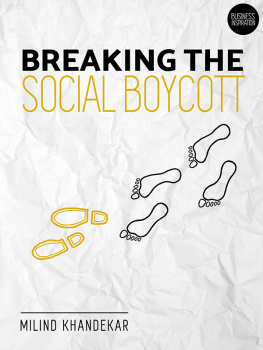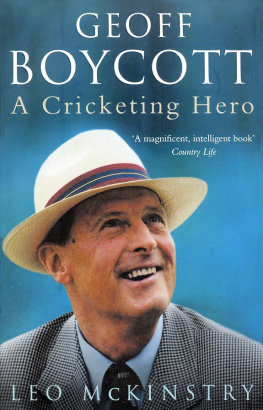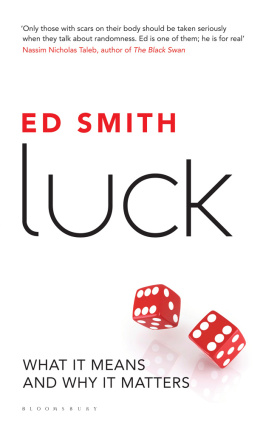This book is dedicated to David Robertson, another great Yorkshireman
Geoffrey Boycott has been a presence in my life since I first fell in love with cricket as a Belfast schoolboy in the early seventies. For me, his appeal lies in the way he embodies a heroic ideal. His struggles to overcome the social disadvantages of his background, the limitations in his natural talent and the contradictions in his own nature are almost epic. He set himself a goal, to become one of the greatest batsmen in the world, and in the face of numerous obstacles many of his own making he ultimately achieved it. His story is, rightly, the stuff of legends.
Like most heroic tales, however, accounts of his life have always varied in the telling. It has therefore been my aim to look beyond much of the mythology that surrounds Boycott and build a more balanced and realistic portrait. Using extensive research and interviews with Boycotts colleagues, friends and family, I tried to provide a deeper understanding of this flawed but compelling sporting personality. In particular, I have sought to place Boycott in a wider context than just that of Yorkshire cricket, the subject that dominated the two previous and partisan biographies of Boycott, one (the pro-Boycott version) by Yorkshire Evening Post journalist John Callaghan, published in 1982, and the other (the anti-Boycott version) written by the late Don Mosey, published in 1985. Only a Yorkshireman can properly comprehend the character and characteristics which have given the Boycott story its unique place in the history of English cricket, Mosey wrote. If that were true, then I, as an Ulsterman living in Essex, have laboured in vain. Yet I believe that this robust view has been part of the problem of interpreting the Boycott phenomenon. By focusing narrowly on Yorkshire, such an approach ignores the truth that Boycott has always been much more than a Yorkshire cricketer. He has also been one of the all-time greats of Test cricket, an England captain, a brilliant coach, a widely read columnist, an iconic broadcaster, and an international celebrity.
Despite my admiration for Boycott, this is not, in any sense, an authorized biography. Boycott politely refused my requests for an interview, though I must record my thanks to him for his assistance in checking facts and in expediting interviews with several of his friends. In the foreword to his 1985 book, Don Mosey wrote of a conspiracy of silence from Boycotts supporters. I am grateful to say that I encountered no such difficulty.
I owe a huge debt of gratitude to all those many first-class and Test cricketers who generously gave me the benefit of their views: Dennis Amiss, Geoff Arnold, Mike Atherton, Bill Athey, Chris Balderstone, Jack Bannister, Bob Barber, Jack Birkenshaw, Dickie Bird, Chris Broad, David Brown, Alan Butcher, Rodney Cass, Brian Close, Howard Cooper, Colin Cowdrey, Andrew Dalton, Mike Denness, Ted Dexter, Keith Fletcher, Norman Gifford, Graham Gooch, David Gower, Tony Greig, Tom Graveney, Frank Hayes, Simon Hughes, Robin Jackman, Paul Jarvis, Peter Kippax, John Lever, Peter Lever, Tony Lewis, David Lloyd, Brian Luckhurst, Richard Lumb, Mark Nicholas, Jim Parks, Pat Pocock, Graham Roope, Kevin Sharp, Mike Smedley, M.J.K. Smith, Robin Smith, Don Shepherd, Ken Taylor, Bernie Thomas, Derek Underwood, Peter Willey, Don Wilson.
Apart from ex-cricketers, many other figures in the media also contributed, as follows: Peter Baxter, Dave Bowden, Max Clifford, Charles Colvile, John Etheridge, Gary Francis, Alan Griffiths, Kelvin MacKenzie, Steve Pierson and Bill Sinrich, plus some who wished to remain nameless.
I would also like to thank the members of Boycotts circle of friends and family who assisted with this project: Philip Ackroyd, Peter Boycott, Peter Briggs, John Callaghan, Alice Harratt, Ted Lester, Lord MacLaurin, Albert Speight, Rachael Swinglehurst, Tony Vann, and Shirley Western. Invaluable memories of Boycotts youth and schooldays were provided by: Des Barrick, Bernard Conway, Bernard Crapper, Eddie Hambleton, Arthur Hollingsworth, Roland Howcroft, Peter Jordan, Terry McCroakham, Terry Newitt, Ken Sale, and Dudley Taylor. I am particularly appreciative of the help that George Hepworth and Malcolm Tate gave me. My many requests for advice and information were always treated with the greatest courtesy. In addition, Sid Fielden showed me the kindest hospitality during a days visit to Headingley.
Others who kindly provided assistance and interviews were: Sarah Cook, Alf Evans, Mike Fatkin, Martin Gray, Nigel Grimes, Keith Hayhurst, Councillor Brian Hazell, Brian Holling, Doug Lloyd, Eric Loxton, Keith Rogers, Keith Stevenson and Barrie Wathen. I am grateful to the staff at the Daily Mail, the Yorkshire Post, and the Westminster Reference Library for helping with newspaper research. Chris Dancy in the BBC archives and Stephen Green at the MCC Library were generous with their time, while Brooke Sinclair and James Perry provided a host of unique insights. The first edition of this book would not have been possible without the backing of the excellent staff at the Partridge Press, especially Patrick Jenson-Smith, Alison Barrow, Katrina Whone, Sheila Lee and Elizabeth Dobson. I was also privileged to have as an editor Adam Sisman, a distinguished, award-winning author in his own right. For this edition, I am grateful to Michael Doggart, Tom Whiting, and the rest of the team at HarperCollins. Thanks also to Paul Dyson for his excellent and original statistical appendix, and to David Hooper for his legal advice.
Finally I would like to thank my wife Elizabeth for her wise counsel and wonderful support during the long months in which Boycs appeared to dominate my every waking thought.
A NOTE ON NOMENCLATURE: Geoffrey Boycott is universally known throughout the cricket world as Boycs, though this is occasionally spelt Boyks or even, in Mike Gattings autobiography, Boyx. His other main nickname has been Fiery, which Boycott says was first used during the South African tour of 1964/65 and is a contraction of Geof-fiery. It was coined, he believes, because he came from the same county as Fiery Fred Trueman, though many have maintained that it referred ironically to his dour batting and public demeanour, just as Chris Tavare was known as Rowdy.
Alternatively, others have said it reflects his quick tongue and temper. The name was generally only used by fellow Test cricketers and never had much currency in Yorkshire. Amongst his followers, GLY (Greatest Living Yorkshireman) or Sir Geoffrey are deemed more suitable.
1
A Contradictory Personality
Wednesday 21 July 1999: Geoffrey Boycott attends an early evening reception at a restaurant in central London where he is one of the guests of honour for the launch of the Federation of International Cricketer Associations new Hall of Fame. Accompanied by his partner Rachael Swinglehurst, he moves amiably through the gathering, sipping from his glass of champagne and indulging in banter with some of the other guests. Then, in the central ceremony of the evening, he is summoned by the former England batsman Tom Graveney on to a stage to accept his induction into the Hall of Fame. In a polished acceptance speech, mixing modesty, humour and charm in equal measure, he describes Tom Graveney as his boyhood hero and pays fulsome tributes to Ian Botham and Fred Trueman, the two other guests of honour.
Anyone watching this performance who did not know of Boycotts reputation would have thought he was one of the most gracious and popular figures in the cricket world. There was no inkling of the festering animosity that has long characterized his relationships with Botham and Trueman, no sign of his notorious boorishness, no evidence of his supposed inability to socialize with others.
22 January 1998: Geoffrey Boycott attends a press conference in central London, where he gives his response to the decision of a French court to convict him of assaulting his former girlfriend Margaret Moore. With his position as a media sports star under threat as a result of the 5,100 fine and three-month suspended jail sentence, Boycott decides to go on the offensive. Bristling with indignation, he denounces Ms Moore, accusing her of telling lies about the incident and claiming that she is out to destroy him because he refused to marry her. As journalists begin to question his account, Boycott slips into the belligerent tone so well known by colleagues from broadcasting and cricket. Shut up, he tells one reporter, this is my conference, not yours. Finally, there is a collective admonition for the press: I am a public figure and the only people I have to answer to are the public, no one else.

